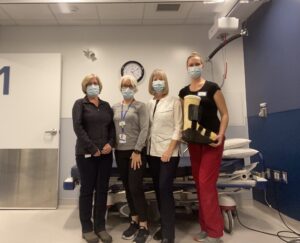Approximately 20% of diabetic patients develop open wounds on the soles of their feet, known as diabetic foot ulcers (DFUs). These ulcers are a major contributing factor of lower leg amputations – they precede about 85% of amputations in diabetics – which can often lead to significant problems with mobility, social isolation, employment status, depression and pain.

Brenda, a nurse who specializes in wound care, knew she could do something to dramatically improve the quality of life for patients with DFUs. She identified total contact casting, which encases the patient’s complete foot and lower leg in a special cast that redistributes weight in the lower leg and foot, as an option and launched a project to implement it at her clinic. To put treatment options in perspective, standard wound care offers 50% healing of the wound in 365 days, while total contact casting offers 90% healing in just 42 days.
The project to introduce total contact casting at the Community Health Services wound clinic started small, with four patients for whom amputation was recommended. After total contact casting, all their wounds closed, including on a patient whose wound closed in just 14 days. Continuing from the pilot, the clinic now boasts an incredible 95% success rate and has so far prevented 22 amputations.
One patient, who had diabetic foot ulcers since 2012, had spent 203 days in the hospital for treatment, visited the emergency department 29 times and received 624 home care nursing visits. When the patient was referred to Brenda and total contact casting was started, the patient fully recovered in just nine weeks.
In addition to the dramatic improvements in quality of life for patients with diabetes, the treatment is cost effective. The project team estimates that total contact casting has saved the province’s health care system between $1.2 and $1.5 million in the two years it has been offered. This includes the savings from prevented amputations, nursing costs and reduced long-term care admissions.
The work has also improved accessibility of care: patients with diabetes often face long wait times – including up to two years to be referred to the clinic. Now its goal is within two days of diagnosis.
To sustain the momentum from the pilot, Brenda has requested permanent funding to continue providing total contact casting as the recommended treatment for DFUs across Island Health. She’s now working with orthopedic surgeons directly to support using total contact casting as prevention care for acute Charcot foot, a rare and serious condition which can limit patients’ mobility. Plus, Nurses Specialized in Wound, Ostomy, Continence have been provided with additional education and equipment to start their own clinics or offer the treatment locally across the Island. Total contact casting is a simple yet extremely effective treatment that is offering patients in Nanaimo their independence back.

